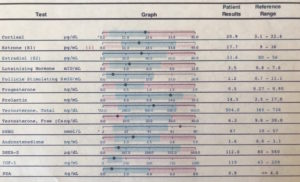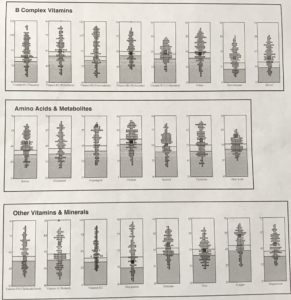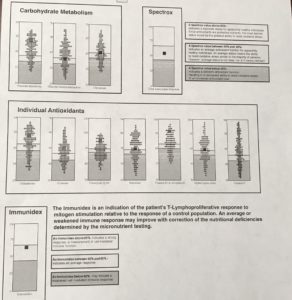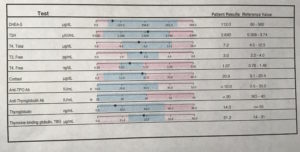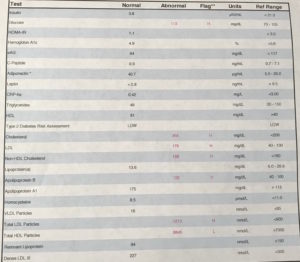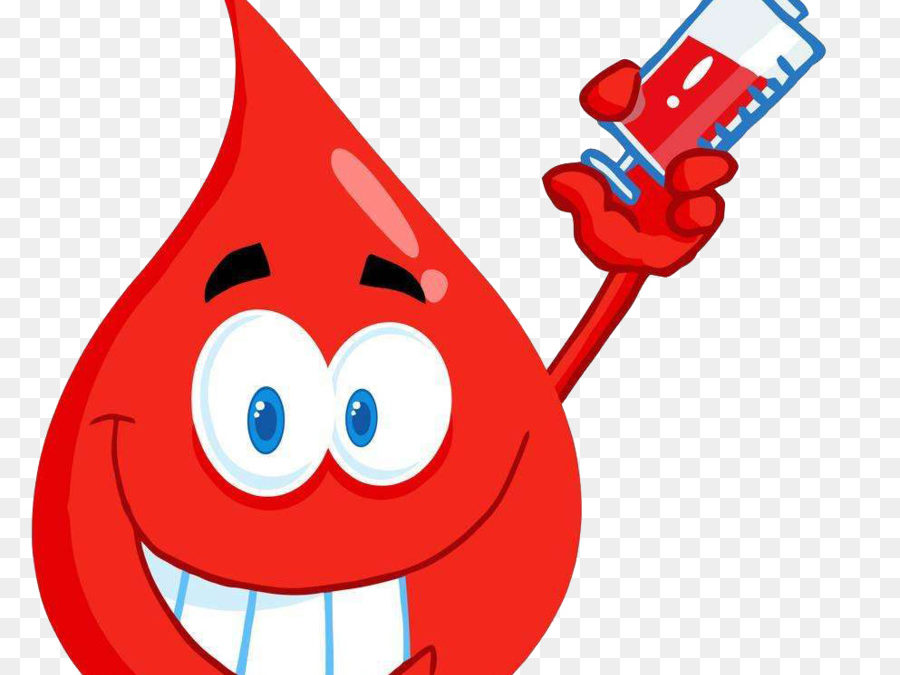
Breaking Down Your Blood Test Results
Recently I had a very unique blood sample taken that looked at my micronutrient profile, hormones, as well as a cardiometabolic profile. The testing was done by a company called SpectraCell and they detect intracellular deficiencies of vitamins, minerals, amino acids and antioxidants by measuring lymphocyte growth. I typically get blood taken every few years and was due so I opted for this route considering I am at the age to get a baseline hormone profile test done. I attached my results below and was surprised at certain things I found.
My cortisol levels were on the high range, but the last few months I have had numerous projects going on so my stress has been higher than normal (have to find ways to manage better!) My total testosterone was on the good side, but my free testosterone levels were low which isn’t surprising considering my cortisol levels were higher than avg. and those two numbers are always inverse to each other. My SHBG was also on the high side which correlates to a low free testosterone score. I don’t have any low free symptoms and recently put on 10 lbs. of muscle, so my theory of true testosterone testing at various times of the day still holds true! My PSA number was low which is great considering how common prostate issues with men are (must be all the lycopene I consume??)
(Click on the picture of my results to enlarge)
The next chart was a panel on micronutrients, antioxidants, and amino’s. The test results also gave me an immune system and carbohydrate metabolism score. My glutamine, B3, and D3 were deficient which isn’t surprising considering glutamine levels in hard training athletes is typically low. B3 (niacin) levels have been shown to correlate with higher LDL cholesterol levels which on page 3 I have slightly elevated levels ( I blame genetics on this one 🙁 I have been supplementing with D3, but obviously I need more in my diet considering I have darker skin and the one hour a day of sunlight I strive for doesn’t always pan out! I was pleased with my antioxidant score, immune function score, and carbohydrate function score.
(click on the picture of my results to enlarge)
Page three was all about thyroid function. This section of the test was very in-depth and included T4 as well as free T3 and T4, and DHEA. I was pleased on this page with my results, especially considering hard training athletes can be prone to hypothyroidism.
(click on the picture of my results to enlarge)
The last page of my panel was a cardiometabolic summary. I have known about a few past “red flags” to watch out for, but was happy to find my overall scores were good. My fasting glucose has always been elevated, but often with intermittent fasting you get that and my Hemoglobin A1C levels were good so I am not concerned. My insulin levels were really low (fat burner), but optimally could be slightly higher which could also bump up my free testosterone levels. My total cholesterol was elevated but if you follow current research that number doesn’t mean much, however my LDL cholesterol was elevated but my Lipoprotein(a) was low which is an almost direct predictor of future heart disease. My omega 3-6 ratio was a surprise. Ideally you want a much better ratio of the two and higher amounts of omega 3. I eat 80% healthy most of the time, but often its not what we eat so much as to how our body breaks it down and uses this. Certain nuts are higher in omega 6, so something to watch out for in my daily nutrition. My CRP and homocysteine levels were really good, which shows the amount of inflammation you have going on. Current research has shown a trend of long-term endurance athletes having higher inflammatory markers than most so I was pleased with this result.
(click on the picture of my results to enlarge)
Overall I was pleased with the format of the test. They even gave you a one hour consultation with one of their physicians to go over your results and help guide you. My personal results are good, but some small improvements can be made. If you look through my results you can see some distinct patterns with regards to what could potentially be a concern. Luckily I eat healthy most of the time, manage stress well, and am always assessing how much rest my body needs. I do find by my results though that genetically I could be at risk for some blood sugar issues if I didn’t take care of myself and trying to obtain optimal health. Healthy lifestyle can trump genetics, but often their are outliers so the least we can do is take care of our bodies and minds the best we can!

